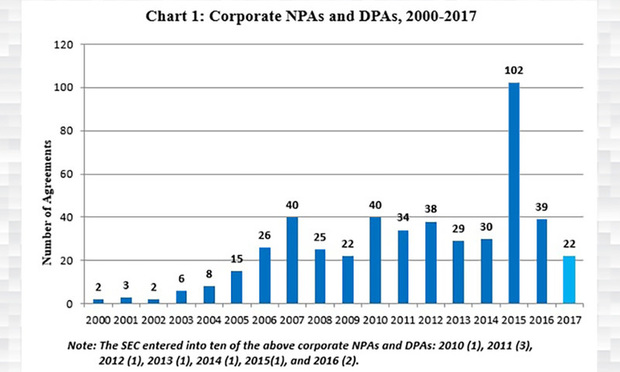DPAs and NPAs Down, but Don't Get Your Corporate Hopes Up
Prosecutors still aren't "pulling a punch in any way," according to Joseph Warin of Gibson Dunn.
January 05, 2018 at 04:16 PM
4 minute read
 Chart Courtesy of Gibson Dunn.
Chart Courtesy of Gibson Dunn. Last year saw federal prosecutors' use of deferred and nonprosecution agreements with companies drop to their lowest level since 2009, according to a new report from Gibson, Dunn & Crutcher.
But the firm's lawyers still aren't telling their corporate clients to relax.
Why not advise in-house lawyers to chill out? “Because line prosecutors and midlevel supervisors are vigorously pursuing cases. We are not seeing people [prosecutors] pulling a punch in any way,” explained Joseph Warin, chair of the Washington, D.C., office's litigation department and co-chair of the firm's white-collar defense and investigations group.
Warin said his firm has seen no change in direction from prosecutors across any subject area, including environmental, criminal fraud and the Foreign Corrupt Practices Act. “We are still seeing vigorous grand jury subpoenas and [pursuit] of witnesses,” he said.
Still, the number of DPAs and NPAs fell to 22 in 2017 (with none issued by the U.S. Securities and Exchange Commission), from 39 in 2016, the last year of the Obama administration. And that contrast is even more dramatic if you consider 39 was a huge drop from 102 agreements in 2015.
An observer might think the Trump administration's pro-business attitudes are having an impact on the number of agreements. But Warin would strongly disagree.
He said Gibson Dunn employs more than 50 former Justice Department lawyers, including Warin himself, who served as an assistant U.S. attorney in Washington, D.C. “We are a pretty good barometer of retrenchment,” Warin said, and it is not happening.
“I've been doing this since 2001,” he added, “and it ebbs and flows, including with the change of administrations, but we are not seeing a [Attorney General Jeff] Sessions/Trump effect now. I've been at DOJ every day this week,” Warin added. “If they are pulling back, it is not evident to me.”
The Gibson Dunn report described the drop in agreements not as a shift in enforcement policy, but “largely a sign—as it was in 2009—of a new administration in transition and the cyclic nature of prosecution.”
In another section, the report noted two unusual NPAs last year.
Most NPAs and DPAs require a clear acknowledgement by the company that the statement of facts is “true and accurate,” and that the company bears responsibility for the actions of officers, directors, employees and agents acting on its behalf.
But that wasn't true in the DOJ National Security Division's deal with Netcracker Technology Corp., a Massachusetts-based subsidiary of NEC Corp. In that NPA, Netcracker was allowed to expressly deny any criminal wrongdoing related to work done for the National Security Division. The DOJ accused the contractor of not keeping the security of its work at an adequate level.
The U.S. Attorney's Office for the Middle District of Pennsylvania allowed a similar disavowal in a deal with several alcoholic beverage companies accused of providing gifts to members of the Pennsylvania Liquor Control Board. The companies were allowed to deny any criminal liability in their NPAs.
There were several other unusual provisions in the NPA with Netcracker, which was represented by F. Whitten Peters and Steven Cady from Williams & Connolly. They included the fact that there was no fine, a “voluntary” compliance plan that Netcracker agreed to, a clause agreeing not to prosecute the company or any present or former employee, and an arbitration provision activated if there is a disagreement on whether or not there has been a breach of the contract.
“The Netcracker resolution was unique and highly creative,” Warin said. “It ought to say to the marketplace that in unique and unusual circumstances, you may be able to forge a non-template resolution structure.”
The report also discussed changes in white-collar enforcement priorities and their likely impacts on NPAs and DPAs; recent developments in court preservation of privacy for corporate monitor reports; and how other countries are developing their own DPA structure, including the United Kingdom, France and Canada.
This content has been archived. It is available through our partners, LexisNexis® and Bloomberg Law.
To view this content, please continue to their sites.
Not a Lexis Subscriber?
Subscribe Now
Not a Bloomberg Law Subscriber?
Subscribe Now
NOT FOR REPRINT
© 2025 ALM Global, LLC, All Rights Reserved. Request academic re-use from www.copyright.com. All other uses, submit a request to [email protected]. For more information visit Asset & Logo Licensing.
You Might Like
View All
Exits Leave American Airlines, SiriusXM, Spotify Searching for New Legal Chiefs
2 minute read


After Botched Landing of United Airlines Boeing 767, Unlikely Plaintiff Sues Carrier
5 minute readTrending Stories
- 1Uber Files RICO Suit Against Plaintiff-Side Firms Alleging Fraudulent Injury Claims
- 2The Law Firm Disrupted: Scrutinizing the Elephant More Than the Mouse
- 3Inherent Diminished Value Damages Unavailable to 3rd-Party Claimants, Court Says
- 4Pa. Defense Firm Sued by Client Over Ex-Eagles Player's $43.5M Med Mal Win
- 5Losses Mount at Morris Manning, but Departing Ex-Chair Stays Bullish About His Old Firm's Future
Who Got The Work
J. Brugh Lower of Gibbons has entered an appearance for industrial equipment supplier Devco Corporation in a pending trademark infringement lawsuit. The suit, accusing the defendant of selling knock-off Graco products, was filed Dec. 18 in New Jersey District Court by Rivkin Radler on behalf of Graco Inc. and Graco Minnesota. The case, assigned to U.S. District Judge Zahid N. Quraishi, is 3:24-cv-11294, Graco Inc. et al v. Devco Corporation.
Who Got The Work
Rebecca Maller-Stein and Kent A. Yalowitz of Arnold & Porter Kaye Scholer have entered their appearances for Hanaco Venture Capital and its executives, Lior Prosor and David Frankel, in a pending securities lawsuit. The action, filed on Dec. 24 in New York Southern District Court by Zell, Aron & Co. on behalf of Goldeneye Advisors, accuses the defendants of negligently and fraudulently managing the plaintiff's $1 million investment. The case, assigned to U.S. District Judge Vernon S. Broderick, is 1:24-cv-09918, Goldeneye Advisors, LLC v. Hanaco Venture Capital, Ltd. et al.
Who Got The Work
Attorneys from A&O Shearman has stepped in as defense counsel for Toronto-Dominion Bank and other defendants in a pending securities class action. The suit, filed Dec. 11 in New York Southern District Court by Bleichmar Fonti & Auld, accuses the defendants of concealing the bank's 'pervasive' deficiencies in regards to its compliance with the Bank Secrecy Act and the quality of its anti-money laundering controls. The case, assigned to U.S. District Judge Arun Subramanian, is 1:24-cv-09445, Gonzalez v. The Toronto-Dominion Bank et al.
Who Got The Work
Crown Castle International, a Pennsylvania company providing shared communications infrastructure, has turned to Luke D. Wolf of Gordon Rees Scully Mansukhani to fend off a pending breach-of-contract lawsuit. The court action, filed Nov. 25 in Michigan Eastern District Court by Hooper Hathaway PC on behalf of The Town Residences LLC, accuses Crown Castle of failing to transfer approximately $30,000 in utility payments from T-Mobile in breach of a roof-top lease and assignment agreement. The case, assigned to U.S. District Judge Susan K. Declercq, is 2:24-cv-13131, The Town Residences LLC v. T-Mobile US, Inc. et al.
Who Got The Work
Wilfred P. Coronato and Daniel M. Schwartz of McCarter & English have stepped in as defense counsel to Electrolux Home Products Inc. in a pending product liability lawsuit. The court action, filed Nov. 26 in New York Eastern District Court by Poulos Lopiccolo PC and Nagel Rice LLP on behalf of David Stern, alleges that the defendant's refrigerators’ drawers and shelving repeatedly break and fall apart within months after purchase. The case, assigned to U.S. District Judge Joan M. Azrack, is 2:24-cv-08204, Stern v. Electrolux Home Products, Inc.
Featured Firms
Law Offices of Gary Martin Hays & Associates, P.C.
(470) 294-1674
Law Offices of Mark E. Salomone
(857) 444-6468
Smith & Hassler
(713) 739-1250






